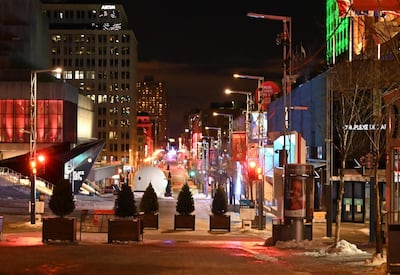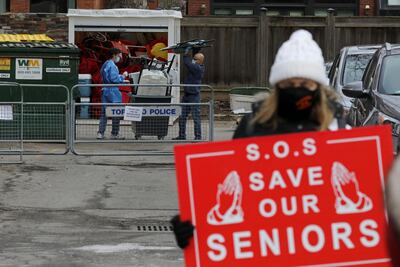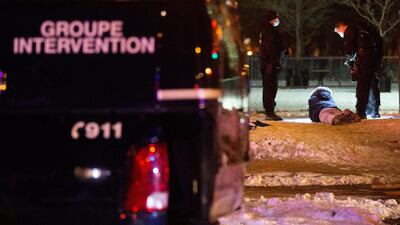Montreal, the city where I live, has gone into another lockdown. I’m not really sure if it’s the third or fourth or fifth – such is the oscillation in measures that have been introduced here over the course of the coronavirus pandemic. Schools close, shops and companies go in and out of business. The only constant is the sound of delivery vehicles bringing food, mail and the next impulse Internet purchase.
The lockdown is different this time, though, because it includes an unprecedented curfew from 8pm to 5am every day, presumably to put a halt to the night-time gatherings and parties trailing the holidays that are fuelling the record case numbers. Standing on the balcony at night is eerily silent. Even sounds in the distance are muted, as are footsteps by the accumulating snowfall.
The latest measures appear to enjoy widespread support – around 70 per cent, according to a recent survey – due to alarm over the record numbers of infections and hospitalisations in Canada as a whole, and the province of Quebec in particular, where wearing masks indoors in public facilities is mandatory. It is a welcome reminder that even as images of insanity stream from south of the border in the US, people here are generally quite reasonable. They want to arrest this plague, even with the end in sight as vaccines are rolled out.
What the public in Canada appears not to have is patience for the hijinks of its elected politicians. Over the past three weeks, several Canadian officials, particularly in Ontario and Alberta, have been forced to resign after taking vacations abroad. Rod Philips, Ontario’s finance minister, resigned after an embarrassingly incompetent online sleuthing effort to cover the tracks of a trip he took to the Caribbean island of St Barts. He went so far as to film a video of himself next to a decorated gingerbread house and a glass of eggnog, wearing a jumper ostensibly to express solidarity with Canadians who spent Christmas in the cold, away from their families.
Tracy Allard, Alberta's municipal affairs minister, and a crucial cog in its vaccine strategy, was similarly forced to resign after she was revealed to have vacationed with her family in Hawaii.
The examples of ministers caught red-handed flying off to winter in warmer climes are almost farcical, were it not for the fact that less well-off people are suffering so disproportionately. I am lucky because I work from home, can afford childcare, can order groceries delivered and can substitute in-person interaction for Zoom meetings without much adverse effect beyond what everyone else is struggling with – the mental health challenges of confinement and isolation coupled with the absence of family and loved ones.
But my lifestyle is made possible by the sacrifices of essential workers, such as Uber Eats delivery workers, doctors, nurses, rubbish collectors, grocery store employees, UPS drivers, factory workers at meatpacking plants, Amazon warehouse employees, mail carriers and many others. And we have failed them, in Canada and elsewhere, leaving them to suffer disproportionately. An investigation in December by the Toronto Star, an Ontario daily, showed that over 7,600 workers had been infected with Covid-19 on the job across that province, but just two fines had been issued by the provincial labour ministry. One of the fines was handed to a worker rather than an employer. Employers have been lax at enforcing guidelines on social distancing and other safety measures to protect these workers. One beef-processing plant in Alberta had an enormous outbreak of over 1,000 cases.
Canada's public has no patience for the hijinks of its elected politicians right now
These facts make travel by the same officials who urged people to stay home for Christmas a bit less funny. The frustration is compounded by the inexplicably slow vaccine rollout. Canada bought enough vaccine doses from various suppliers, including Pfizer-BioNTech and Moderna, to vaccinate the entire population several times over, and officials say they are on track still to do so by the fall of 2021.
But the rollout has been slow, to put it charitably, largely because it is in the hands of individual provinces. While Israel and the UAE have led the world in vaccination, inoculating 22.2 per cent and 12.9 per cent of their populations, respectively, Canada has so far managed to vaccinate 0.9 per cent of the population. The lack of alacrity contrasts sharply with the urgency of the crisis, despite Canada having had so long to plan for it.
The pandemic has tested humanity more than anything in recent memory. In the past few weeks, the initial hope offered by vaccines morphed into dread and then resignation to the fact that we in Canada have months still before we get through this tunnel. In poorer countries who cannot afford to purchase millions of doses, coming out the other side may take years. We all still have a way to go.
Perhaps as we contemplate our eventual release back into normality, a life without masks and with hugs, we ought to remember once again that the option of isolating or sheltering at home is made possible only by the sacrifices of thousands of people who do not have that option. We owe them an incalculable sum that must be reflected in their wages, benefits, mental health care and our collective gratitude. These are all measures that Canada has so far failed to introduce. But they are as crucial to the country's health as any others.
Kareem Shaheen is a veteran Middle East correspondent in Canada and a columnist for The National
UAE currency: the story behind the money in your pockets
MATCH INFO
Championship play-offs, second legs:
Aston Villa 0
Middlesbrough 0
(Aston Villa advance 1-0 on aggregate)
Fulham 2
Sessegnon (47'), Odoi (66')
Derby County 0
(Fulham advance 2-1 on aggregate)
Final
Saturday, May 26, Wembley. Kick off 8pm (UAE)
COMPANY PROFILE
Name: Qyubic
Started: October 2023
Founder: Namrata Raina
Based: Dubai
Sector: E-commerce
Current number of staff: 10
Investment stage: Pre-seed
Initial investment: Undisclosed
Some of Darwish's last words
"They see their tomorrows slipping out of their reach. And though it seems to them that everything outside this reality is heaven, yet they do not want to go to that heaven. They stay, because they are afflicted with hope." - Mahmoud Darwish, to attendees of the Palestine Festival of Literature, 2008
His life in brief: Born in a village near Galilee, he lived in exile for most of his life and started writing poetry after high school. He was arrested several times by Israel for what were deemed to be inciteful poems. Most of his work focused on the love and yearning for his homeland, and he was regarded the Palestinian poet of resistance. Over the course of his life, he published more than 30 poetry collections and books of prose, with his work translated into more than 20 languages. Many of his poems were set to music by Arab composers, most significantly Marcel Khalife. Darwish died on August 9, 2008 after undergoing heart surgery in the United States. He was later buried in Ramallah where a shrine was erected in his honour.
It Was Just an Accident
Director: Jafar Panahi
Stars: Vahid Mobasseri, Mariam Afshari, Ebrahim Azizi, Hadis Pakbaten, Majid Panahi, Mohamad Ali Elyasmehr
Rating: 4/5
Specs
Engine: Duel electric motors
Power: 659hp
Torque: 1075Nm
On sale: Available for pre-order now
Price: On request
Results
4pm: Maiden (Dirt) Dh165,000 1,600m
Winner: Moshaher, Pat Dobbs (jockey), Doug Watson (trainer).
4.35pm: Handicap (D) Dh165,000 2,200m
Winner: Heraldic, Richard Mullen, Satish Seemar.
5.10pm: Maiden (Turf) Dh165,000 1,600m
Winner: Rua Augusta, Harry Bentley, Ahmad bin Harmash.
5.45pm: Handicap (D) Dh190,000 1,200m
Winner: Private’s Cove, Mickael Barzalona, Sandeep Jadhav.
6.20pm: Handicap (T) Dh190,000 1,600m
Winner: Azmaam, Jim Crowley, Musabah Al Muhairi.
6.55pm: Handicap (D) Dh190,000 1,400m
Winner: Bochart, Richard Mullen, Satish Seemar.
7.30pm: Handicap (T) Dh190,000 2,000m
Winner: Rio Tigre, Mickael Barzalona, Sandeep Jadhav.
COMPANY%20PROFILE
%3Cp%3E%3Cstrong%3ECompany%20name%3A%3C%2Fstrong%3E%20Switch%20Foods%3Cbr%3E%3Cstrong%3EStarted%3A%3C%2Fstrong%3E%202022%3Cbr%3E%3Cstrong%3EFounder%3A%3C%2Fstrong%3E%20Edward%20Hamod%3Cbr%3E%3Cstrong%3EBased%3A%3C%2Fstrong%3E%20Abu%20Dhabi%2C%20UAE%3Cbr%3E%3Cstrong%3EIndustry%3A%3C%2Fstrong%3E%20Plant-based%20meat%20production%3Cbr%3E%3Cstrong%3ENumber%20of%20employees%3A%3C%2Fstrong%3E%2034%3Cbr%3E%3Cstrong%3EFunding%3A%3C%2Fstrong%3E%20%246.5%20million%3Cbr%3E%3Cstrong%3EFunding%20round%3A%3C%2Fstrong%3E%20Seed%3Cbr%3E%3Cstrong%3EInvestors%3A%3C%2Fstrong%3E%20Based%20in%20US%20and%20across%20Middle%20East%3C%2Fp%3E%0A
Company%20profile
%3Cp%3E%3Cstrong%3ECompany%20name%3A%20%3C%2Fstrong%3EXare%C2%A0%3C%2Fp%3E%0A%3Cp%3E%3Cstrong%3EStarted%3A%20%3C%2Fstrong%3EJanuary%2018%2C%202021%C2%A0%3C%2Fp%3E%0A%3Cp%3E%3Cstrong%3EFounders%3A%20%3C%2Fstrong%3EPadmini%20Gupta%2C%20Milind%20Singh%2C%20Mandeep%20Singh%C2%A0%3C%2Fp%3E%0A%3Cp%3E%3Cstrong%3EBased%3A%20%3C%2Fstrong%3EDubai%C2%A0%3C%2Fp%3E%0A%3Cp%3E%3Cstrong%3ESector%3A%20%3C%2Fstrong%3EFinTech%C2%A0%3C%2Fp%3E%0A%3Cp%3E%3Cstrong%3EFunds%20Raised%3A%20%3C%2Fstrong%3E%2410%20million%C2%A0%3C%2Fp%3E%0A%3Cp%3E%3Cstrong%3ECurrent%20number%20of%20staff%3A%20%3C%2Fstrong%3E28%C2%A0%3C%2Fp%3E%0A%3Cp%3E%3Cstrong%3EInvestment%20stage%3A%20%3C%2Fstrong%3Eundisclosed%3C%2Fp%3E%0A%3Cp%3E%3Cstrong%3EInvestors%3A%20%3C%2Fstrong%3EMS%26amp%3BAD%20Ventures%2C%20Middle%20East%20Venture%20Partners%2C%20Astra%20Amco%2C%20the%20Dubai%20International%20Financial%20Centre%2C%20Fintech%20Fund%2C%20500%20Startups%2C%20Khwarizmi%20Ventures%2C%20and%20Phoenician%20Funds%3C%2Fp%3E%0A
UAE currency: the story behind the money in your pockets
Lexus LX700h specs
Engine: 3.4-litre twin-turbo V6 plus supplementary electric motor
Power: 464hp at 5,200rpm
Torque: 790Nm from 2,000-3,600rpm
Transmission: 10-speed auto
Fuel consumption: 11.7L/100km
On sale: Now
Price: From Dh590,000
Key facilities
- Olympic-size swimming pool with a split bulkhead for multi-use configurations, including water polo and 50m/25m training lanes
- Premier League-standard football pitch
- 400m Olympic running track
- NBA-spec basketball court with auditorium
- 600-seat auditorium
- Spaces for historical and cultural exploration
- An elevated football field that doubles as a helipad
- Specialist robotics and science laboratories
- AR and VR-enabled learning centres
- Disruption Lab and Research Centre for developing entrepreneurial skills
How to protect yourself when air quality drops
Install an air filter in your home.
Close your windows and turn on the AC.
Shower or bath after being outside.
Wear a face mask.
Stay indoors when conditions are particularly poor.
If driving, turn your engine off when stationary.
It’ll be summer in the city as car show tries to move with the times
If 2008 was the year that rocked Detroit, 2019 will be when Motor City gives its annual car extravaganza a revamp that aims to move with the times.
A major change is that this week's North American International Auto Show will be the last to be held in January, after which the event will switch to June.
The new date, organisers said, will allow exhibitors to move vehicles and activities outside the Cobo Center's halls and into other city venues, unencumbered by cold January weather, exemplified this week by snow and ice.
In a market in which trends can easily be outpaced beyond one event, the need to do so was probably exacerbated by the decision of Germany's big three carmakers – BMW, Mercedes-Benz and Audi – to skip the auto show this year.
The show has long allowed car enthusiasts to sit behind the wheel of the latest models at the start of the calendar year but a more fluid car market in an online world has made sales less seasonal.
Similarly, everyday technology seems to be catching up on those whose job it is to get behind microphones and try and tempt the visiting public into making a purchase.
Although sparkly announcers clasp iPads and outline the technical gadgetry hidden beneath bonnets, people's obsession with their own smartphones often appeared to offer a more tempting distraction.
“It's maddening,” said one such worker at Nissan's stand.
The absence of some pizzazz, as well as top marques, was also noted by patrons.
“It looks like there are a few less cars this year,” one annual attendee said of this year's exhibitors.
“I can't help but think it's easier to stay at home than to brave the snow and come here.”
Company profile
Date started: December 24, 2018
Founders: Omer Gurel, chief executive and co-founder and Edebali Sener, co-founder and chief technology officer
Based: Dubai Media City
Number of employees: 42 (34 in Dubai and a tech team of eight in Ankara, Turkey)
Sector: ConsumerTech and FinTech
Cashflow: Almost $1 million a year
Funding: Series A funding of $2.5m with Series B plans for May 2020
Result:
1. Cecilie Hatteland (NOR) atop Alex - 31.46 seconds
2. Anna Gorbacheva (RUS) atop Curt 13 - 31.82 seconds
3. Georgia Tame (GBR) atop Cash Up - 32.81 seconds
4. Sheikha Latifa bint Ahmed Al Maktoum (UAE) atop Peanuts de Beaufour - 35.85 seconds
5. Miriam Schneider (GER) atop Benur du Romet - 37.53 seconds
6. Annika Sande (NOR) atop For Cash 2 - 31.42 seconds (4 penalties)
Karwaan
Producer: Ronnie Screwvala
Director: Akarsh Khurana
Starring: Irrfan Khan, Dulquer Salmaan, Mithila Palkar
Rating: 4/5
The%20specs
%3Cp%3E%3Cstrong%3EEngine%3A%3C%2Fstrong%3E%201.8-litre%204-cyl%20turbo%0D%3Cbr%3E%3Cstrong%3EPower%3A%20%3C%2Fstrong%3E190hp%20at%205%2C200rpm%0D%3Cbr%3E%3Cstrong%3ETorque%3A%3C%2Fstrong%3E%20320Nm%20from%201%2C800-5%2C000rpm%0D%3Cbr%3E%3Cstrong%3ETransmission%3A%20%3C%2Fstrong%3ESeven-speed%20dual-clutch%20auto%0D%3Cbr%3E%3Cstrong%3EFuel%20consumption%3A%3C%2Fstrong%3E%206.7L%2F100km%0D%3Cbr%3E%3Cstrong%3EPrice%3A%3C%2Fstrong%3E%20From%20Dh111%2C195%0D%3Cbr%3E%3Cstrong%3EOn%20sale%3A%20%3C%2Fstrong%3ENow%3C%2Fp%3E%0A
Learn more about Qasr Al Hosn
In 2013, The National's History Project went beyond the walls to see what life was like living in Abu Dhabi's fabled fort:
Wicked: For Good
Director: Jon M Chu
Starring: Ariana Grande, Cynthia Erivo, Jonathan Bailey, Jeff Goldblum, Michelle Yeoh, Ethan Slater
Rating: 4/5
FIXTURES
Monday, January 28
Iran v Japan, Hazza bin Zayed Stadium (6pm)
Tuesday, January 29
UAEv Qatar, Mohamed Bin Zayed Stadium (6pm)
Friday, February 1
Final, Zayed Sports City Stadium (6pm)
Other must-tries
Tomato and walnut salad
A lesson in simple, seasonal eating. Wedges of tomato, chunks of cucumber, thinly sliced red onion, coriander or parsley leaves, and perhaps some fresh dill are drizzled with a crushed walnut and garlic dressing. Do consider yourself warned: if you eat this salad in Georgia during the summer months, the tomatoes will be so ripe and flavourful that every tomato you eat from that day forth will taste lacklustre in comparison.
Badrijani nigvzit
A delicious vegetarian snack or starter. It consists of thinly sliced, fried then cooled aubergine smothered with a thick and creamy walnut sauce and folded or rolled. Take note, even though it seems like you should be able to pick these morsels up with your hands, they’re not as durable as they look. A knife and fork is the way to go.
Pkhali
This healthy little dish (a nice antidote to the khachapuri) is usually made with steamed then chopped cabbage, spinach, beetroot or green beans, combined with walnuts, garlic and herbs to make a vegetable pâté or paste. The mix is then often formed into rounds, chilled in the fridge and topped with pomegranate seeds before being served.
The rules on fostering in the UAE
A foster couple or family must:
- be Muslim, Emirati and be residing in the UAE
- not be younger than 25 years old
- not have been convicted of offences or crimes involving moral turpitude
- be free of infectious diseases or psychological and mental disorders
- have the ability to support its members and the foster child financially
- undertake to treat and raise the child in a proper manner and take care of his or her health and well-being
- A single, divorced or widowed Muslim Emirati female, residing in the UAE may apply to foster a child if she is at least 30 years old and able to support the child financially
Top 10 in the F1 drivers' standings
1. Sebastian Vettel, Ferrari 202 points
2. Lewis Hamilton, Mercedes-GP 188
3. Valtteri Bottas, Mercedes-GP 169
4. Daniel Ricciardo, Red Bull Racing 117
5. Kimi Raikkonen, Ferrari 116
6. Max Verstappen, Red Bull Racing 67
7. Sergio Perez, Force India 56
8. Esteban Ocon, Force India 45
9. Carlos Sainz Jr, Toro Rosso 35
10. Nico Hulkenberg, Renault 26




